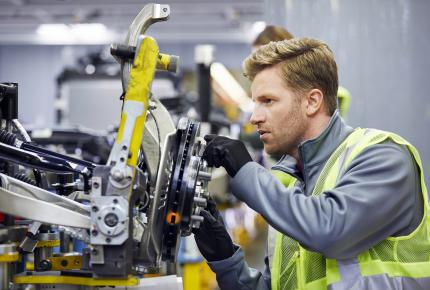
Navigating life after COVID-19 in the automotive sector using management systems
Automakers are slowly coming out of coronavirus lockdown and restarting production. Many of the challenges they face are not new, but have been amplified by the crisis.
The economic shock triggered by the coronavirus pandemic is the largest in the automotive industry’s living memory.
First came the hit to supply as plants in China – one of the world’s largest manufacturers of vehicle parts and accessories (UN Comtrade, 2018) – stopped production, resulting in shortages at OEM production sites around the world. Then the collapse in demand, as Europe then the United States followed cities in China into lockdown. The result is that worldwide automotive sales are expected to be around a fifth lower in 2020 than in the previous year (Statista, 2020).This is of concern to automakers, who are cautiously restarting production as new COVID-19 infections start to level off in some countries. Ramp-up is expected to be slow, with the industry at around 10-20% of capacity by late April, and around a third fewer vehicle manufactured in 2020 compared to the previous year. Europe – where passenger car registrations fell 55% in March alone (European Automobile Manufacturers’ Association, 2020) – is expected to see the worst of the impact, followed by the United States and China.
This weak consumer demand is likely to weigh on the sector, even as manufacturers contend with ongoing supply chain issues and increased sanitary measures on production lines.
Supply chains: no longer business as usual?
Ironically, the OEM shutdown in Europe and the United States has softened the blow of supply chain interruptions. It has taken an extreme situation for automakers to fully recognize the potential flaws of globalized supply chains. Just five countries – Germany, the United States, Japan, China and Mexico – account for over half of exports.
Some automakers were already starting to weigh up different options in anticipation of risks to supply chains posed by Brexit, or the tariff war between the United States and China. The coronavirus crisis is likely to speed up that evaluation process. The crisis has demonstrated that manufacturers are too dependent on long-distance suppliers. The problem is particularly stark in the automotive sector with its just-in-time delivery model but is true of many other industries.
This is why re-localization is likely to emerge as a key post-COVID-19 cross-industry theme. The European auto industry had already begun re-localizing production for EV battery assembly, but there is an opportunity for parts manufacturers to gain a greater slice of the pie for other technologies. To take advantage of the opportunity, they will need to be inventive, efficient and service-oriented. The same stakes are replicated in the United States, and in the growing market in Africa.
Meeting new production challenges in 2020
In the meantime, the automotive industry will need to adapt its resources and processes to a highly challenging context. Having a strong management system such as IATF 16949 can support manufacturers’ ability to understand the difficulties and risks they face, and adapt their processes without compromising on quality. Maintaining certification in the post-COVID 19 period, or obtaining it in 2021 and beyond, will remain a competitive advantage for certified companies to demonstrate maturity, performance and professionalism.
In the medium term, sanitary measures will pose a particular challenge. Many countries have not yet specified the exact criteria for emerging from lockdown, but it is likely that social distancing will remain in place for some time. Maintaining preventive measures such as appropriate distance between workers, regular handwashing and sanitization of equipment and facilities will be complex in plants that usually employ thousands of workers. A robust health and safety management system can support managers to assess risks and develop customized plans for each site. Certification to a standard such as ISO 45001 can support communication and show employees and other stakeholders that the manufacturer is taking its obligations seriously.
Finally, many manufacturers today are getting to grips with information security. Not only in the design of products but also in their exchange of data with suppliers – and employees. Remote working has become commonplace for teams involved in roles ranging from R&D, design and development to sales and marketing. Many of these managers and engineers will continue to work from home for a while. This increases the need to reinforce data protection. One solution manufacturers are turning to is TISAX® (Trusted Information Security Assessment Exchange). Certification to the standard enables manufacturers to meet industry requirements and demonstrate to consumers that they take data protection seriously.
Bureau Veritas is supporting clients throughout the coronavirus crisis and beyond. Our certification and training services help them prioritize safety while delivering the quality and service their customers expect. Working alongside our clients, our services are helping them reinforce their capacity to adapt and prepare for a new automotive era.
For more information, read our dedicated content on:
- IATF 16949 (Offer and Technical Guide),
- ISO 45001 (Offer and Technical Guide)
- TISAX® (Offer and Technical Guide).
|
TISAX® TECHNICAL GUIDE |
TISAX® SERVICE SHEET |
TISAX® IS A BRAND PROPERTY OF ENX ASSOCIATION. BUREAU VERITAS IS FORMALLY RECOGNIZED BY ENX ASSOCIATION TO CONDUCT TISAX® AUDIT ASSESSMENT.

